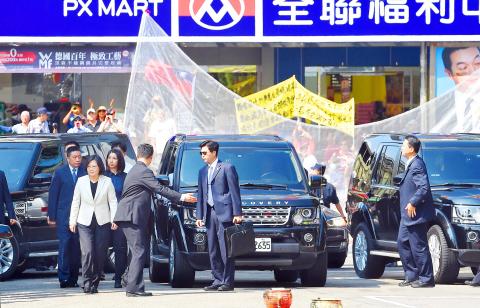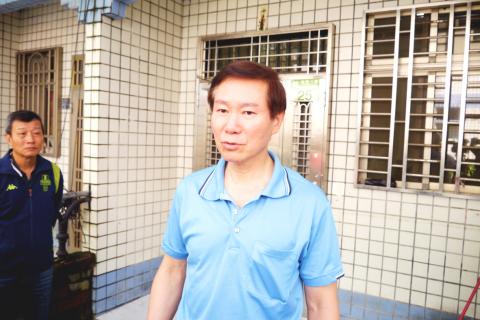High supporter numbers, leaks in the police department and assistance from former police officers are enabling protesters to run effective “guerrilla” campaigns, despite increased security around President Tsai Ing-wen (蔡英文), pension reform opponents said yesterday, adding that “mobile human wall” tactics to keep them away from Tsai’s motorcade would not work.
Protesters have promised to “shadow” Tsai following the passage of pension reforms last month and have had some success in breaking through an increased police presence around the president, including briefly halting her motorcade outside National Defense University in Taipei’s Beitou District (北投) on Thursday last week.
“There are only two roads in and out of the university, so where could she go? The police cannot change the roads,” said Keng Chi-wen (耿繼文), a former director of the National Police Agency’s Internal Affairs Office, who has been one of the most prominent former police officers participating in protests.

Photo: Liu Hsin-de, Taipei Times
Protesters stood along both sides of Zhongyang N Road, moving in front of Tsai’s motorcade as it approached the university entrance before being pushed aside by police.
An increased police presence and barricades around Tsai to keep protesters from getting too close when she arrives at a destination means that “guerrilla” tactics have been used to get close to her, with former police officers who are familiar with presidential security helping show protesters how to congregate and scatter along potential motorcade routes, Keng said.
“We are experts, so it is easy for us to predict the president’s route and backup route,” he said, adding that protesters also often receive leaked information from police.

Photo: Wang Chun-chi, Taipei Times
“We can make quick observations and then divide our forces along potential routes, so there is a chance of blocking her regardless of which way they drive,” he said.
“It might be different if Tsai was just a movie star who could come and go quietly, but presidential security leaves an extremely obvious footprint,” Taiwan Policemen Association executive director Chen Chih-chieh (陳志傑) said, adding that protesters relay signs of police reconnaissance and barricading via social media to predict the president’s movements and mobilize quickly.
“There are different standard operating procedures for the president compared with the vice president or a minister, so we can predict who is coming based on police preparations,” Chen said.
Reports that police plan to begin deploying a “mobile human wall” to counter protesters’ tactics drew disparaging remarks.
“Even if they block off one point, we will just catch Tsai later on,” Keng said.
“Even if the wall succeeds, the sight of policemen being forced to run around would still be embarrassing to Tsai, which is our objective,” Chen said.
It is possible Tsai might be faced with a car suddenly “breaking down” in front of her motorcade, Yunlin County Retired Police Officers Association executive director Lai Kun-yu (賴坤柚) said.

The Thai government on Friday announced that Taiwanese would be allowed to stay in the country for up to 60 days per entry, under the Southeast Asian country’s visa-free program starting from today. Taiwan is among 93 countries included in the Thai visa-waiver program, which has been expanded from 57 countries, with the visa-exempt entry extended from 30 to 60 days. After taking office last year, Thai Prime Minister Srettha Thavisin has vowed to grant more visa waivers to foreign travelers as part of efforts to stimulate tourism. The expanded visa-waiver program was on Friday signed by Thai Minister of the Interior Anutin

PEACE AND SECURITY: China’s military ambitions present ‘the greatest strategic challenge to Japan and the world, Japan’s annual defense white paper said yesterday Japan yesterday warned that China risked escalating tensions with Taiwan with an increase in military exercises that appeared aimed in part at readying Beijing’s forces for a possible invasion. Japan’s annual assessment of security threats, including those posed by China, North Korea and Russia, comes as Taiwan closely monitors Chinese People’s Liberation Army air and sea exercises, including one with the Shandong aircraft carrier in the Pacific Ocean. The drills are the latest in a series including maneuvers in the Taiwan Strait last year that a senior US general said would be key to any invasion. “Because of that increase in military activity,

CHIPS AND DEFENSE: Trump said the US had lost its chip business and Taipei should pay it for defense, and added that ‘we’re no different than an insurance company’ Taiwan-US relations are solid, and both sides are in agreement that peace and stability in the Taiwan Strait and the Indo-Pacific region are everyone’s concern, Premier Cho Jung-tai (卓榮泰) said yesterday following comments by former US president Donald Trump that Taiwan “should pay” for US defense. Taiwan is thankful to the US for supporting Taiwan’s bid to participate in international organizations, Cho told a news conference in Taipei. “I know the people very well, respect them greatly. They did take about 100 percent of our chip business,” Trump told Bloomberg on June 25 in an interview that was published on Tuesday. “I think

SECURITY CONCERNS: An FBI agent said it was surprising that the shooter, whose motive remains unknown, was able to open fire before the Secret Service killed him On the heels of an apparent attempt to kill him, former US president Donald Trump yesterday called for unity and resilience as shocked leaders across the political divide recoiled from the shooting that left him injured, but “fine,” and the shooter and a rally-goer dead. The presumptive Republican presidential nominee said the upper part of his right ear was pierced in the shooting His aides said he was in “great spirits” and doing well. “I knew immediately that something was wrong in that I heard a whizzing sound, shots, and immediately felt the bullet ripping through the skin. Much bleeding took place,” he